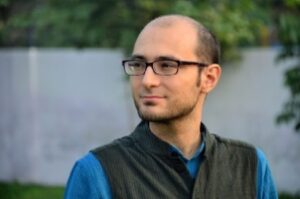Andrea Acri is Maître de conférences (tenured Assistant Professor) in Tantric Studies at the Religious Studies Section of the École Pratique des Hautes Études (EPHE, PSL University, Paris), and contracted researcher at the École française d’Extrême-Orient (EFEO) in Paris in framework of the ERC Synergy project “DHARMA” (2021–2023). He has a Laurea degree from the University of Rome “Sapienza” (2005) and an MA and PhD from Leiden University (2006, 2011), all with focus on South and Southeast Asian Studies and disciplinary specialization in Philology (Sanskrit, Old Javanese) and Religious Studies. He has held research and teaching positions in India (Nalanda University), Singapore (Nalanda-Sriwijaya Centre/ISEAS and Asia Research Institute/NUS), Australia (ANU), and the Netherlands (IIAS). He is member of the editorial board of the Journal of the Royal Asiatic Society and of the Journal of Yoga Studies, and has conducted various projects funded by grants from the American Academy of Religion (AAR), the British Library, and other academic and governmental institutions.
His main research and teaching interests include the history and circulation of Śaiva and Buddhist tantric traditions in South and Southeast Asia; Yoga Studies; Indian Philosophy; the religious history of Java and Bali from the premodern to the modern period in the light of textual sources; and wider cultural and historical dynamics of intra-Asian maritime connectivity. He is actively engaged in the edition and translation of Sanskrit-Old Javanese texts, and has published on premodern and modern Javanese literature and visual/performative arts, as well as modern Balinese Hinduism. His interest in yoga includes the histories of Tantric yoga (ṣaḍaṅgayoga) and Pātañjala yoga (aṣṭāṅgayoga) and their relationship, as well as their reception and transformation in Java and Bali. His study of the Dharma Pātañjala, an Old Javanese text that appropriates Pātañjala Yoga and the Pātañjalayogaśāstra in a thoroughly Śaiva framework, has not only highlighted the transcultural dimension of yoga in the premodern period, but also demonstrated that textual sources from the Indonesian Archipelago may cast a fresh perspective on yoga traditions in South Asia.
Publications related to Yoga:
Books
2011 Dharma Pātañjala; A Śaiva Scripture from Ancient Java Studied in the Light of Related Old Javanese and Sanskrit Texts. Gonda Indological Studies XVI, xviii + 706 pp. Groningen: Egbert Forsten/Brill. [Second edition 2017, Śata-Piṭaka Series, Indo-Asian Literatures 654, New Delhi: Aditya Prakashan; translation into Bahasa Indonesia, 2018, Jakarta: École française d’Extrême-Orient and KPG].
Articles
2021 ‘Yoga and Meditation Traditions in Insular Southeast Asia’, in K. O’Brien-Kop and S. Newcombe (eds.), Routledge Handbook of Yoga and Meditation Studies, pp. 273–290. London/New York: Routledge.
2015 ‘Between Impetus, Fear, and Disgust: ‘‘Desire for Emancipation’’ (saṃvega) from Early Buddhism to Pātañjala Yoga and Śaiva Siddhānta’, in P. Bilimoria and A. Wenta (eds.), Emotions in Indian Thought-Systems, pp. 199–227. London/New Delhi: Routledge.
2013 ‘Modern Hindu Intellectuals and Ancient Texts: Reforming Śaiva Yoga in Bali’, Bijdragen tot de Taal-, Land- en Volkenkunde / Journal of the Humanities and Social Sciences of Southeast Asia and Oceania 169-1: 68–103.
2012 ‘Yogasūtra 1.10, 1.21–23, and 2.9 in the Light of the Indo-Javanese Dharma Pātañjala’, Journal of Indian Philosophy 40-3: 259–276.
2011 ‘Re-configuration of Divinity in Old Javanese Śaiva texts from the Indonesian Archipelago (with special reference to Jñānasiddhānta, chapter 19)’,Travaux de Symposium International: Le Livre. La Roumanie. L’Europe. Troisième édition, Tome III, pp. 546–65. Bucarest: Éd. Bibliothèque de Bucarest.
Many of Dr Acri’s published articles may be downloaded from his Academia.edu webpage.
